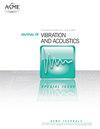Experimental Verification of Pulse Shaping in Elastic Metamaterials under Impact Excitation
IF 1.9
4区 工程技术
Q2 ACOUSTICS
Journal of Vibration and Acoustics-Transactions of the Asme
Pub Date : 2022-08-14
DOI:10.1115/1.4056043
引用次数: 0
Abstract
We present experimental verification of pulse shaping in elastic metamaterials together with a procedure to design, fabricate, and verify metamaterial pulse shapers under impact excitation. The Split Hopkinson Pressure Bar (SHPB) test, a fundamental dynamic test introduced more than 70 years ago, often incorporates pulse shaping as a means to alter a stress wave, providing the primary motivation for the presented study. Elastic metamaterials hold promise for enhancing conventional pulse shaping abilities and improving capabilities of the SHPB test. We first design the pulse shaper by numerically optimizing its response using finite element analysis. The pulse shaper consists of repeated unit cells based on a combination of a phononic crystal and a local resonator. We then fabricate and test pulse shaper candidates to validate the procedural efficacy. An iterative element corrects inaccuracies in input force and material properties and allows convergence on an appropriate pulse shaper. We carry-out this procedure by designing pulse shapers fabricated from 3D-printed polylactic acid (PLA) to achieve an extended dwell acceleration pulse shape. In experimental impact tests, the procedure results in rise, dwell, and fall behaviors comparable to that predicted, effectively confirming the efficacy of the presented procedure and verifying the performance of metamaterial-based pulse shapers.冲击激励下弹性超材料脉冲成形的实验验证
我们提出了弹性超材料脉冲成形的实验验证,以及在冲击激励下超材料脉冲成形器的设计、制造和验证过程。分离式霍普金森压力杆(SHPB)测试是70多年前引入的一种基本的动态测试,通常采用脉冲整形作为改变应力波的手段,这是本研究的主要动机。弹性超材料在增强常规脉冲成形能力和提高SHPB测试能力方面具有广阔的前景。本文首先利用有限元分析对脉冲整形器的响应进行了数值优化设计。脉冲整形器由基于声子晶体和局部谐振器组合的重复单元组成。然后,我们制造和测试候选脉冲成形器来验证程序有效性。迭代元件校正输入力和材料特性的不准确性,并允许在适当的脉冲整形器上收敛。我们通过设计由3d打印聚乳酸(PLA)制成的脉冲成形器来实现这一过程,以实现扩展的驻留加速脉冲形状。在实验冲击测试中,该程序的上升、停留和下降行为与预测结果相当,有效地证实了该程序的有效性,并验证了基于超材料的脉冲成形器的性能。
本文章由计算机程序翻译,如有差异,请以英文原文为准。
求助全文
约1分钟内获得全文
求助全文
来源期刊
CiteScore
4.20
自引率
11.80%
发文量
79
审稿时长
7 months
期刊介绍:
The Journal of Vibration and Acoustics is sponsored jointly by the Design Engineering and the Noise Control and Acoustics Divisions of ASME. The Journal is the premier international venue for publication of original research concerning mechanical vibration and sound. Our mission is to serve researchers and practitioners who seek cutting-edge theories and computational and experimental methods that advance these fields. Our published studies reveal how mechanical vibration and sound impact the design and performance of engineered devices and structures and how to control their negative influences.
Vibration of continuous and discrete dynamical systems; Linear and nonlinear vibrations; Random vibrations; Wave propagation; Modal analysis; Mechanical signature analysis; Structural dynamics and control; Vibration energy harvesting; Vibration suppression; Vibration isolation; Passive and active damping; Machinery dynamics; Rotor dynamics; Acoustic emission; Noise control; Machinery noise; Structural acoustics; Fluid-structure interaction; Aeroelasticity; Flow-induced vibration and noise.

 求助内容:
求助内容: 应助结果提醒方式:
应助结果提醒方式:


